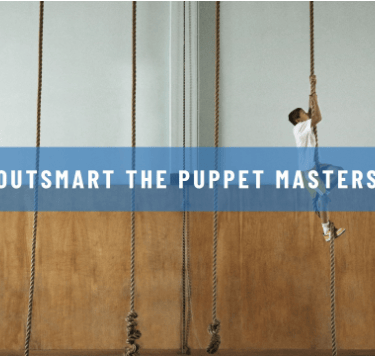The Great Indian Chessboard - Outsmart the Puppet Master
Outsmart the Puppet Master - Bollywood Style :)
ILLUSTRATIVE ARTICLECOMIC TONERESILIENCE


Once upon a time in a bustling city, there lived a man named Kshitij—sharp as a tack, yet humble as the dosas at your favorite street stall. Kshitij wasn’t just any man; he was a creator, a thinker, and someone who, if left alone, could have crafted a legacy as strong as the walls of Golconda Fort. But, alas, not every story starts with a hero in control.
You see, Kshitij had unknowingly become the favorite pawn of a group of crafty operators, known in the local circles as “The Chameleons.” Why Chameleons, you ask? Because these fellows could change their colors faster than you could say, “Kuch meetha ho jaye!” They had one ancient relic—a single, shabby piece of paper. This paper, as old as your grandmother's recipe book, had the power to turn men into puppets. The Chameleons, with their many contacts, used it to blackmail people, swaying them to their side like a politician during election season.
But Kshitij, poor soul, was their prized puppet. He didn’t just face the wrath of the paper; he was under constant surveillance. They watched him as closely as your mom watches you when you say you’ll have just one more gulab jamun. These Chameleons weren’t just interested in watching Kshitij; they were waiting, pouncing on every idea he birthed, claiming it as their own like an overzealous uncle claiming credit for a successful family function.
Now, Kshitij wasn’t born yesterday. He knew the game was rigged, the dice were loaded, and the cards were marked. But he also knew that no one wins a game of chess by just moving the pieces; you win by anticipating your opponent’s moves.
Kaminey Ka Khela (The Game of the Cunning)
Kshitij realized that the first step in defeating the Chameleons was understanding their game. They relied on short-term gains, using that ancient piece of paper to fall people into submission. But Kshitij knew that fear is like a mirchi; it burns brightly for a while, but with time, it fades. He decided to let them have their moment, smiling to himself like a sage who knows the future but doesn’t bother to warn the unsuspecting.
He also knew that information is power, but misinformation? Oh, that’s gold! So, Kshitij began feeding the Chameleons just enough of the truth to keep them interested, but not enough to make any significant moves. Every time they thought they had trapped him, he would slip away, leaving them with nothing but empty threats and a sense of confusion. It was like playing Kabaddi with shadows; they tried to tackle, but he was always just out of reach.
Rajniti Ka Raasta (The Political Path)
Kshitij then turned his attention to the people—the same people who had been influenced by the Chameleons. He knew that a little bit of kindness goes a long way, and in India, nothing beats a good old-fashioned chai session. He started hosting small gatherings, where he shared stories of his struggles, not as a victim, but as a warrior. He spoke in riddles, used metaphors, and let his audience draw their conclusions.
He knew the Chameleons were watching, but he didn’t care. The stories spread like wildfire, and soon, people began to see the Chameleons for what they were—bullies hiding behind an ancient piece of paper. Kshitij didn’t need to expose the Chameleons; he let the people do it for him. After all, in India, a good story spreads faster than a rumor about free laddus at a temple.
Bhagwan Ka Bharosa (Trust in the Divine)
Finally, Kshitij knew that while the Chameleons relied on material power, he had something far more potent—faith. He wasn’t just fighting for himself; he was fighting for the truth. And in India, the truth is like the Ganga—no matter how much muck you throw in it, it purifies itself.
So, Kshitij began to focus on his work, pouring his heart and soul into it. He knew that true greatness couldn’t be stolen; it had to be earned. The Chameleons could claim his ideas, but they couldn’t claim his passion, his dedication, or his spirit. And that’s what the people saw—a man who, despite the odds, refused to bow down.
The Moral of the Story:
In the end, the Chameleons were left with nothing but a dusty old piece of paper and a reputation more tarnished than a politician’s promise. Kshitij, on the other hand, emerged stronger, wiser, and with a following that no amount of blackmail could buy.
So, the next time you find yourself up against a group of crafty chameleons, remember Kshitij’s story. Play the game, tell your story, and trust in the truth. And if all else fails, never underestimate the power of a well-timed chai break and a good laugh. After all, in India, humor is the best weapon—one that even the cleverest of chameleons can’t dodge.
P.S.:
This is a work of fiction. Any resemblance to actual persons, living or dead, or actual events is purely coincidental. The story and characters are entirely imaginary, created for entertainment and illustrative purposes only.
